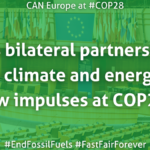Climate finance has been bumped down the pecking order of climate ambition during UN Climate Summit in Lima.
Agreements concerning both pre- and post-2020 actions coming out of the conference contain only vague language on this crucial issue. If unsolved, it can severely compromise chances for an ambitious global agreement on climate action in Paris next year.
In the pre-2020 climate finance discussions we are welcomed with general words, such as “scaling up”, “mobilize” and “strategies”. Unfortunately, we don’t have any clarity on how the developed countries are going to provide the promised USD 100 billion a year, which is aimed at supporting developing countries in their climate action. In the post-2020 framework, climate finance has been displayed as a bargaining chip for the summit in Paris next year. Whether that’s the case or not, the perception is there. The final outcome of Lima summit is thus lackluster and gives little comfort that finance will be central to the 2015 agreement.
The hotly contested issue of climate finance is completely interlinked with the other key areas of an ambitious climate agreement. How come it has been neglected by the talks in Lima?
There have been two parallel discussions on finance in the final days of the COP20. The first one aimed to address and agree on finance in the coming years and all the way to 2020. On this aspect, CAN Europe has been calling on the EU and other developed countries to agree to lay down a roadmap for eventual agreement in Paris. Such a roadmap would be the needed step to continue scaling up climate finance, so that in 2020 it would reach USD 100 billion. The roadmap would build on the initial pledges to the Green Climate Fund, which after the summit in Lima amount to approximately USD 10 billion. It is an essential element to ensuring developing countries that developed nations are serious about their financial commitments. Nevertheless the roadmap has not been agreed upon.
The second discussion is directly linked to the first. It aimed to seek some kind of middle ground on climate finance in the information that countries will be required to provide as part of their post-2020 efforts to stay below the 2°C temperature rise. This is where the EU drew the line, expressing the strong position that it views these information requirements to be about emission reduction only. As expected, developing countries and emerging economies take a different stance. They feel that in order to put forward ambitious emission cuts targets next year, finance – or means of implementation – will be essential to information requirements put forward by countries.
Therein lies the problem: with developed countries shying away from more concrete finance commitments up until and after 2020 and developing countries losing faith as a result.
Without unpacking and addressing the finance challenge, ambitious steps towards Paris will be severely compromised. Though we strive for ambition in the EU, there also needs to be flexibility among all countries to achieve the overall goal of the UNFCCC process – tackling climate change. At times during the COP20 it really felt as if countries had forgotten this, and all the international civil society calls for progress and real action.
As we enter into the year that should take us towards immediate action and a long-term transition to a fully renewable future, it is a rocky road we are travelling on. However, with strong political will and continued belief in the spirit of this process, the journey could become much smoother and successful. As for finance, it also requires the will to be a catalyst rather than a blocker for action.
By Maeve McLynn, Policy Officer (Finance/2015)



